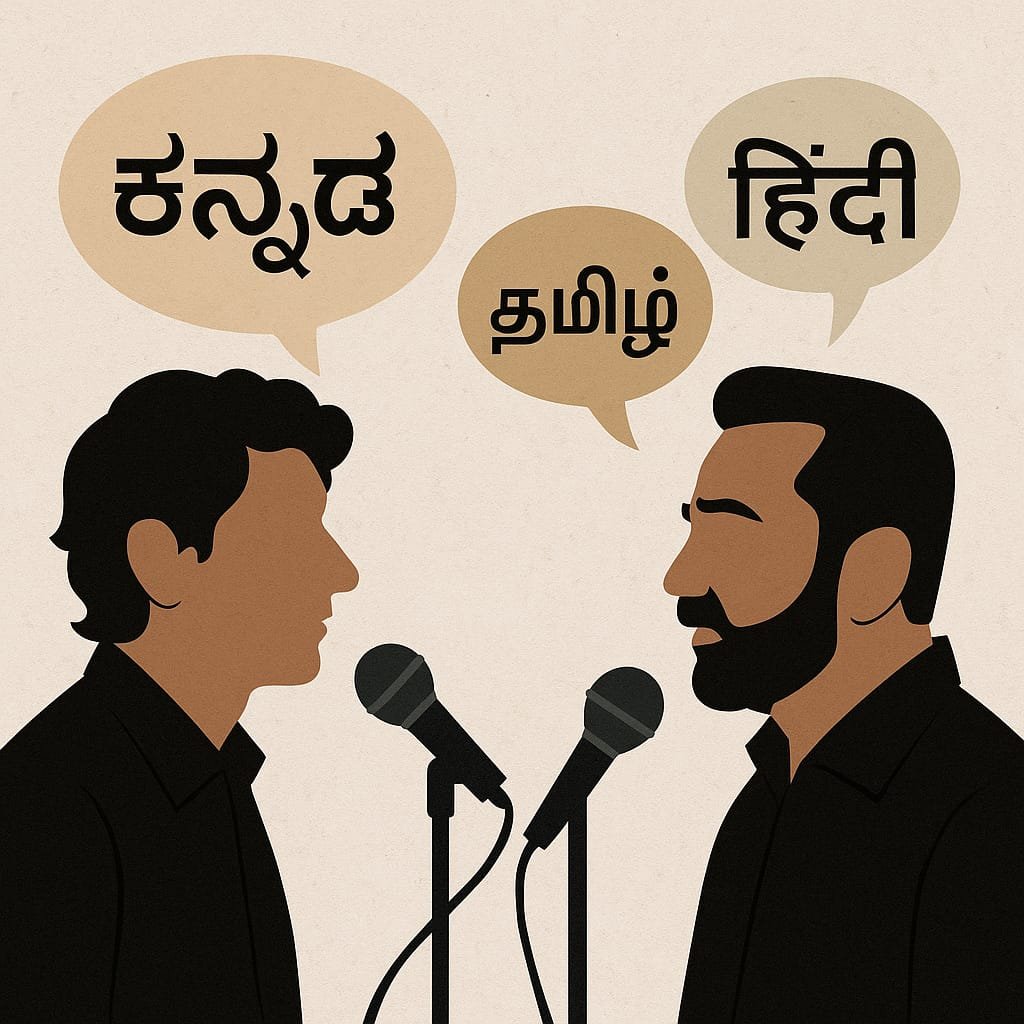
In recent days, Karnataka has once again found itself at the centre of a linguistic controversy, one that strikes a chord deeper than mere semantics. With over 50 million native speakers, Kannada is not just a regional language; it is the official language of Karnataka, a classical language of India, and one of only six languages granted classical status by the Government of India for its antiquity, literary tradition, and cultural depth. Kannada also boasts the highest number of Jnanpith awardees—eight in total— among Indian languages. Despite such legacy, Kannada increasingly finds itself marginalized in its own capital, Bengaluru, a city that has become synonymous with migration, technology, and linguistic dilution.
Three Sparks, One Firestorm
The Kannada language, the cultural lifeblood of the state, was thrust into debate following three separate incidents involving prominent public figures. First, Sonu Nigam, the celebrated Bollywood singer, declined to sing a Kannada song during a Bengaluru concert. Though he later apologized, it left many locals feeling slighted. Second, an SBI bank manager was filmed refusing to speak Kannada to a customer, proudly claiming she would "never learn Kannada." The video sparked outrage online and reignited calls for stronger language policy. Finally, Tamil actor and politician Kamal Haasan’s claim that “Kannada was born from Tamil”—however linguistically debatable—was viewed as dismissive and condescending toward Kannada’s distinct heritage.
A City of Contrasts: Bengaluru’s Language Disconnect
These incidents are symptoms of a larger issue: Kannada, despite being constitutionally protected, is often ignored in everyday life, especially in Bengaluru. Shoba Narayan, writing in the Hindustan Times, highlights the disconnect between the city’s economic modernity and cultural alienation. Migrants come to the city, thrive professionally, but often remain linguistically disconnected. In stark contrast to cities like Chennai or Mumbai, where the local language is non-negotiable in daily transactions, Bengaluru has developed a tolerance that many now see as being exploited.
Politeness Mistaken for Passivity
Kannadigas, known for their welcoming and accommodating nature, are beginning to push back—not from a place of chauvinism but of cultural preservation. For too long, their politeness has been mistaken for apathy. When celebrities skip Kannada songs, when officials mock the language, or when businesses ignore it on signboards, it chips away at local identity. As Narayan aptly asks, could one live in Paris or Beijing for decades without speaking French or Mandarin? Why, then, is it acceptable to live in Karnataka without knowing Kannada?
More Than Words: A Question of Dignity
At the heart of this linguistic friction lies something deeper: dignity. From Basavanna’s Vachanas to Kuvempu’s epics, Kannada has carried philosophical and literary traditions for centuries. Yet in tech parks, malls, and even government offices, Kannada is increasingly treated as secondary. The Karnataka Official Language Act (1963) mandates Kannada in administration, but poor enforcement renders it symbolic rather than functional. Unlike Tamil Nadu, which enforces Tamil-first policies rigorously, Karnataka has relied on goodwill. That goodwill, many believe, is wearing thin.
The Need for a Cultural Revival, Not Just Legal Orders
Top-down government circulars rarely work unless reinforced by bottom-up pride. The New Education Policy (NEP) opens a window to promote Kannada alongside other languages without alienating non-native speakers. The state must capitalize on this by integrating Kannada more meaningfully into education, digital content, and urban spaces. Beyond that, Kannada must be made aspirational again—through popular culture, music, OTT platforms, and social media.
A Gesture of Belonging, Not Burden
Learning Kannada should not be framed as a burden for migrants. It is a gesture of respect. People who build their lives and fortunes in Karnataka owe it to the state to engage with its cultural core. No one is demanding exclusivity—only inclusivity. Speaking Kannada in Karnataka should be as natural and expected as speaking Bengali in Kolkata or Punjabi in Amritsar.
Final Take: Not Just a Language, But an Identity
The recent controversies are not isolated incidents. They are expressions of a deeper discontent. Apologies from celebrities and officials are welcome but no longer sufficient. Kannada needs structural support, institutional enforcement, and most of all, societal respect. If Bengaluru wants to remain truly cosmopolitan, it must also remain unapologetically Kannada. The language is not just a tool of communication—it is the emotional and cultural identity of a people. And it deserves to be spoken, heard, and honoured.





















